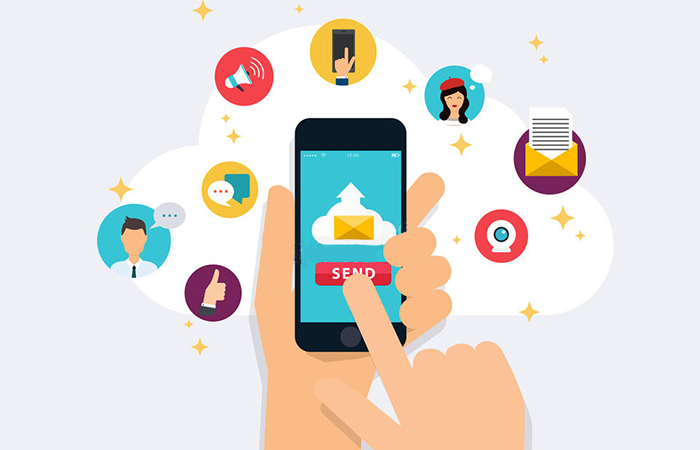
Email marketing is a term you may have heard recently, but exactly what is email marketing?
What is email marketing?
At its most basic level, email marketing is the use of email to promote your business. It is used to cultivate relationships with potential customers, keep current customers informed and updated on your brand, offer coupons to encourage customer loyalty, and more!
It is a direct form of marketing, similar to marketing through snail mail, but email marketing is much more efficient for your wallet and for the environment since it’s totally paperless!
Some people think email marketing is outdated, but they couldn’t be more wrong. Email marketing has been utilized since shortly after the birth of the Internet. It has evolved considerably since then and is still an incredibly useful marketing tool. In fact, many entrepreneurs argue that email marketing is more important now than ever before. There’s a good reason 85% of U.S. retailers consider email marketing one of the most effective customer acquisition tactics!
So what is email marketing used for?
Email marketing can be used to build trust with customers over time to turn them into repeat customers. It is also an effective way to keep your customers informed about new sales or promotions you are running. People want to stay informed about your brand, and email marketing is one of the best ways to stay engaged with that audience. In fact, 28% of US online shoppers report subscribing to store or product emails in order to stay informed on brands they care about.
What is email marketing software?
There are tons of software and automation tools out there that make email marketing a breeze. For example, MailChimp and Constant Contact can be used to send out emails and monitor how your subscribers interact with your emails. You can also use email marketing software to track analytics like click-through rates, open rates, bounce rates, and conversions.
So now that we’ve answered your question about what this marketing strategy really is, you might be asking “So does my business need email marketing?” Of course! All businesses can benefit from email marketing, especially small businesses. Email marketing tends to be inexpensive and easy to track, especially in comparison to other forms of traditional marketing.
What is the benefit of email marketing over other methods of marketing?
94% of Internet users use email. Therefore, marketing through email allows you to reach a great deal of Internet users even if they are not on social media. Furthermore, a survey found that an astounding 75% of adult online users say email marketing is actually their preferred marketing method!
If you’re not already utilizing email marketing, it is definitely something you should consider in order to reach a wider audience and strengthen your brand’s relationship with current customers.
Another benefit of email marketing is that it’s incredibly easy to track your ROI. Everything is trackable with the use of email marketing software so you can determine who is opening your emails, who is clicking onto your site through your emails, and more.
Plus, the ROI is usually very high because you don’t have to put ad money behind emails to get them to the correct audience like you do with most other forms of advertising. They are already targeted towards the ideal consumer because you are only sending emails to people who have given you permission via providing you with their email address. This makes email marketing one of the cheapest possible marketing tactics.
One little-known fact is that 66% of all emails in the U.S. are opened on mobile devices such as smartphones or tablets. If you’ve been considering using a text message or SMS campaign, email marketing might actually be a better choice for you. Email marketing works pretty much the same way as SMS marketing, but you can reach desktop users as well and most smartphone users find emails to be less bothersome than text messages from companies.
While email marketing is often used in conjunction with other forms of marketing like social media advertising and even TV and radio ads, it has its own unique set of advantages.
For example, let’s say you have an ecommerce store and you’re running a sale. When you post about the sale on social media, not all your followers will see it. Only about 1% of your followers will typically see a Facebook post unless you’ve boosted it using ad dollars. If you send an email about your sale, it is guaranteed to be put in front of every single member of your email list.
Another big difference between email marketing and other forms of marketing is that people actually want to see your email promotions! Anyone on your email list purposefully provided you with their email address because they wanted more information on your brand.
This is quite different from ads on search engines, social media, TV, magazines, and radio. Someone who comes across your ad on Facebook or while watching the morning news did not request to learn more about your brand, so they are more likely to ignore your message or even be bothered by it.
If a consumer directly provides you with their email address, it is because they specifically want to opt in to your email marketing. They may have been tempted with a coupon or some other promotion, but it is still a much more consent-based marketing strategy. This is part of what makes email marketing so unique and so successful!
How does email marketing work with other forms of marketing?
As we continue to further explain this form of marketing, we must also mention how it works best with other marketing efforts. As mentioned previously, email marketing works extremely well alongside social media marketing. You are able to cross-promote your company’s social media profiles on emails with buttons requesting that your email subscribers follow you. You can also use your social media profiles to gather an email list to use in your email marketing campaigns.
There are a few ways to do this, one of which is to run a giveaway on your social media accounts that requests people provide their email address in order to enter.
You can also simply make posts asking your social media followers to subscribe to your email list and provide a link to a form they can sign up on.
Odds are, if they were interested enough to follow your brand on social media, they will want to learn more about your brand through email, as well.
You can even set up a lead generation campaign on Facebook geared towards collecting emails which you can then use in an email marketing campaign.
Email marketing also works in conjunction with a remarketing campaign! You can use emails to send cart reminders to your remarketing audience. These emails can even be personalized with specific products from your online store! See the image below for an example.
How do you start an email marketing campaign?
What is email marketing? — It’s incredibly versatile. Using email marketing software, you can customize emails with subscribers’ names and can send out personalized emails for people’s birthdays. You can even maintain separate email lists and send out different offers or promotions to different audience sets.
Not every email you come up with will resonate with every one of your email subscribers, so it may be beneficial to segment your email lists and create different emails that correspond to different portions of your overall audience.
The first step to starting an email marketing campaign is to gather an email list. Before a potential subscriber provides you with their email address, there are a few questions they are likely to consider. Will you spam them? What do they have to gain from giving you their email address? Will you send special discounts? Will you make their email address public or sell it? You’re going to want to make it clear to would-be subscribers that they will benefit from subscribing to your email list and you will not spam them or give anyone else their email address.
There are countless ways to build your email list, but a good place to start is to embed an email registration form on your website. This way you can leverage your existing website visitors and offer them special information or discounts in exchange for their email address. You can also use your social media accounts to gather emails, as mentioned previously.
What should be the email content?
Once you have a solid email list, it’s time to start planning your emails. There is a vast range of content you can include in your emails and unique formatting options to choose from. Email marketing is much more customizable than other forms of advertising, so the sky’s the limit!
Some examples of content you can include on your emails are links to articles on your website, loyalty rewards for subscribers, customer testimonials, information about new promotions or sales, and announcements about new items or services. Emails can also be used to simply remind people who have expressed interest in your company that you exist!
When they finally join your email list, don’t forget to send them a compelling welcome message. Keep in mind that they are not just warm leads but a potential paying customer as well. And if you do your job right, they will also turn into your brand ambassadors – for free. You just have to impress them and this welcome message is the first chance you’ll get. Make it count.
On the subject of loyalty rewards, 64% of U.S. Internet users have printed a coupon from an email! Email coupons can be used to drive both in-store and online sales, making them incredibly valuable tools that can easily be incorporated into your email marketing strategy. The promise of email coupons is also an excellent way to get people to subscribe to your email list!
From writing the perfect subject line to selecting the most eye-catching layout, crafting your emails can be overwhelming. Don’t worry! We’re here to help! The content you include in your emails really depends on the type of business you are running. However, there are some techniques that work best for most businesses.
For example, a study by the Relevancy Group found that marketers who add video to their email campaigns see a rise in revenue of approximately 40%. Infographics, lists, and promotions/discounts also make for very appealing emails.
Just be careful not to make all your emails about selling products. Your emails should also include valuable information your subscribers may be interested in reading. Some examples of content that can add value to your emails are answers to popular FAQs, snippets from blog posts on your website, and surveys or polls.
What should be the email layout?
As far as layout goes, congruency is key. Your emails should match the style of your website, ads, and social media accounts for consistent branding. Also, since about half of all emails are opened on mobile devices, you’re going to want to make sure your emails are mobile-friendly.









More Stories
A Guide to Email Marketing Software – GetResponse-vs-ConvertKit
10 Email Marketing Statistics Every Business Owner Should Know
The Practical Guide to Building a High-Converting Email Funnel